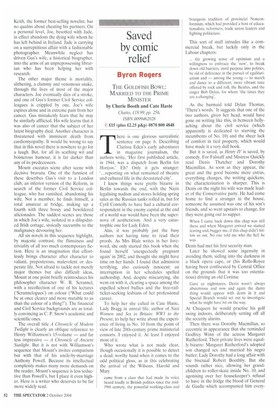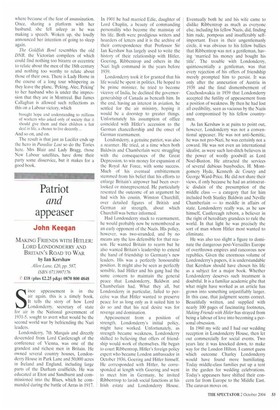Saved by comic relief
Byron Rogers
THE GOLDFISH BOWL: MARRIED TO THE PRIME MINISTER by Cherie Booth and Cate Haste Chatto, £18.99, pp. 256, ISBN 0099462028
£15 (plus 12.25 p&p) 0870 800 4848
There is one glorious surrealistic sentence on page 6. Describing Clarissa Eden's early adventures in magazine journalism, the authors write, 'Her first published article, in 1944, was a dispatch from Berlin for Horizon.' Eh? Only it gets stranger: `...reporting on what remained of theatre and cultured life in the devastated city'.
I knew things were pretty bizarre in Berlin towards the end, with the Nazis legalising nudism and stores holding spring sales as the Russian tanks rolled in, but for Cyril Connolly to have had a cultural correspondent in the enemy capital at the end of a world war would have been the supernova of aestheticism. And a very catastrophic one for Lady Eden.
Alas, it was probably just the busy authors not having time to read their proofs. As Mrs Blair writes in her foreword, she only started this book when she found herself 'unexpectedly pregnant again' in 2002, and thought she might have time on her hands. I found that admission terrifying, also curiously innocent: an interruption in her schedules spelled authorship. And, despite miscarrying, she went on with it, clearing a space among the expelled school bullies and the free-railticket-seeking lesbians of her professional career.
To help her she called in Cate Haste, Lady Bragg in unreal life, author of Nazi Women and Sex in Britain: WWI to the Present, to help her write about the experience of living in No. 10 from the point of view of late 20th-century prime ministerial consorts. I enjoyed it. At least I enjoyed most of it.
Who wrote what is not made clear, though occasionally it is possible to detect a dead, worthy hand when it comes to the odd political gloss, as in this celebrating the arrival of the Wilsons. Harold and Mary
came from a class that had made its voice heard loudly in British politics since the mid19th century, the powerful working-class and bourgeois tradition of provincial Nonconformism, which had provided a host of educationalists, reformers, trade union leaders and fighting politicians.
This sort of stuff intrudes like a commercial break, but luckily only in the Labour chapters:
... the growing sense of optimism and a willingness to embrace the 'new', to break down old barriers, instil purpose into politics, be rid of deference in the pursuit of egalitarianism and — among the young — to march and dance to a different, more vibrant tune offered by rock and roll, the Beatles, and the singer Bob Dylan, for whom 'the times they are a-changing'.
As the barmaid told Dylan Thomas, 'There's words.' It suggests that one of the two authors, given her head, would have gone on writing like this, in between bellyaching about the civil service (which apparently is dedicated to starving the incumbents of No. 10) and the sheer lack of comfort in tied property, which would have made it a very dull book.
But it is saved, as Henry IV is saved, by comedy. For Falstaff and Mistress Quickly read Denis Thatcher and Dorothy Macmillan. As soon as they appear, the great and the good become mere extras, everything changes, the writing quickens, the characterisation is sharper. This is Denis on the night his wife was made leader of the Conservative party. He had come home to find a stranger in the house, someone he assumed was one of his son's friends, and so went upstairs to change, for they were going out to supper.
When I came back down this chap was still there and when Margaret arrived we started leaving and, bugger me, if this chap didn't follow us out. No one told me who the hell he was.
Denis had met his first security man.
Later he showed some ingenuity in avoiding them, sidling into the darkness in a black opera cape, or (his Rolls-Royce having been confiscated by Central Office on the grounds that it was too ostentatious) driving an old Cortina:
Gave us nightmares. Denis wasn't always abstemious and now and again the damn thing would appear with dents in it and Special Branch would set out to investigate what he might have hit on the way.
At Chequers he would practise his golf swing indoors, deliberately setting off all the security alarms.
Then there was Dorothy Macmillan, so eccentric in appearance that she reminded Godfrey Winn of the actress Margaret Rutherford. Their private lives were equally bizarre: Margaret Rutherford's adopted son changed sex and married his negro butler; Lady Dorothy had a long affair with the bisexual Robert Boothby. But she sounds rather nice, allowing her grandchildren to roller-skate inside No. 10, and agonising over her housekeeper's refusal to have in the fridge the blood of General de Gaulle which accompanied him every
where because of the fear of assassination. Once, sharing a platform with her husband, she fell asleep as he was making a speech. Woken up, she loudly announced her intention of going to sleep again.
The Goldfish Bowl resembles the old DNB, the Victorian compilers of which could find nothing too bizarre or eccentric to relate about the men of the 18th century and nothing too worthy to relate about those of their own. There is Lady Home in the course of a long tour whispering as they leave the plane, 'Peking, Alec, Peking' to her husband who is under the impression that they are in Montreal. But James Callaghan is allowed such reflections as this on a Labour victory, which
brought hope and understanding to millions of workers who asked only of society that it should give them and their children a fair deal in life, a chance to live decently...
And so on, and on.
The result is that just as Lucifer ends up the hero in Paradise Lost so do the Tories here. Mrs Blair and Lady Bragg, those New Labour satellites, have done their party some disservice, but it makes for a good book.



















































































 Previous page
Previous page